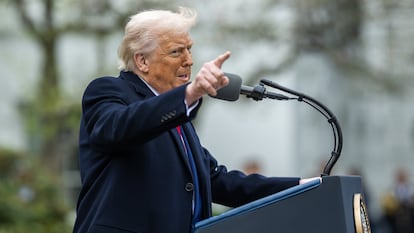Taking advantage of Trump’s destruction of the US
Trumpism is inflicting severe damage on both his country and others. However, for Europe, it may present an opportunity to regain ground, restore vitality, and rebuild confidence in itself

The world is watching in astonishment as the Neronian fire rages in Washington. Trump’s declaration of a trade war against the world is a new, colossal, self-destructive move by the United States. Trump is destroying the core pillars of U.S. power — an extraordinary network of alliances and a framework of globalization that has long benefited the country — while igniting a force that fuels distrust, resentment, and contempt nearly universally across the globe. The self-inflicted damage is incalculable. Unfortunately, the oceans won’t shield us from this kind of blaze, and its flames will cause great harm to others across the globe.
However, amid the hegemonic country’s self-destruction, there lie, in addition to risks, great opportunities for others. For Europe as well. The paths are many, but they can perhaps be summed up in one concept: restoring vitality.
Europe has been suffering a slow hemorrhage for decades, with demographic and military strength in decline, an exodus of talent and capital — particularly to the United States — and an increasing irrelevance in global affairs. The chaos of the Neronian fire presents great challenges, but also a great opportunity to reverse these trends.
The alarming, obscurantist political climate in the United States is already prompting a major reevaluation of science, research, and the pursuit of talent. If people want to leave, will they turn to an increasingly authoritarian China under Xi Jinping? There are reasons to believe that Europe stands a good chance of becoming the preferred destination — a sanctuary for those disillusioned by a political landscape that stifles research through prejudice, ignorance, and dogma.
Economic brutality can also lead to positive consequences. As Daniel Fuentes has already pointed out in EL PAÍS, it could provide an opportunity to stem the outflow of European savings to the United States, a trend that has deprived European businesses of a vital source of income. But there’s more: how many people worldwide are now reconsidering their trips to the U.S. in light of the harshness of border controls? How many are reevaluating their purchases of certain products linked to Trumpism? These are opportunities for substitution.
The deep distrust generated by Trumpism is obviously a key factor in breaking Europe’s longstanding infantilism when it comes to defense and security, a position we have comfortably maintained for decades. No, it’s not about spending 5% of GDP on defense, as Trumpism demands, while simultaneously imposing tariffs on us — perhaps hoping we’ll spend it on American weapons. It’s about rethinking our weaknesses and dependencies, working to steer clear of bad ideas from others, and becoming more self-reliant on key issues.
We also face a tremendous opportunity to project soft power. Despite its terrible abuses in recent decades — from orchestrating coups to the invasion of Iraq, from the torture at Abu Ghraib to its unwavering support for Israeli Prime Minister Benjamin Netanyahu — the United States has wielded significant global influence through culture, entertainment, and aspirational symbols. However, U.S. leadership now evokes such shock and indignation in a vast portion of the world’s population that it seems logical to expect a strong backlash. So, who can seize this opportunity?
China’s loans without awkward questions are undoubtedly highly valued, and its spectacular growth over the past few decades is admired. Yet, it is doubtful that this will transform a brutal authoritarian regime into a true force of soft power. Europe faces its own challenges in assuming this role. Its impotence in the face of Israel’s warmongering has severely tarnished its global image. Even so, there are reasons to believe that Europe’s model is better positioned than those of the U.S., Russia, or China to serve as a benchmark.
Of course, we can be pioneers in the regulatory and sanctioning efforts against the horsemen of the technological apocalypse — those grim figures who, in their pursuit of profits, have aligned themselves with Trump. For some, it seems that their strategy is already backfiring. The EU is the best-positioned actor to counter this wave and can serve as an inspiring model for others. It is also the best positioned to forge new trade relationships, as Brussels is rightly attempting to do. We must learn from the past mistakes of unchecked or naïve free trade, but the solution is not autarky or excessive sovereignty — but rather a more sensible approach to free trade.
More broadly, the Trumpist process of self-destruction — and the undeniably serious risks it entails —are a tremendous force driving European integration, which is precisely what Europe needs to thrive. Of course, nationalist and pro-Trumpist movements are strong within Europe. But, again, there lies an opportunity: how many Spaniards will support the far-right Vox party’s clumsy efforts to avoid criticizing Trumpism? This doesn’t necessarily mean an immediate loss of votes, and it’s wise not to underestimate adversaries or their capacity for manipulation. But, at the very least, what’s unfolding in Washington will complicate things for like-minded European forces.
Above all, this cataclysm is an opportunity to believe in ourselves once again, even if it’s out of despair. The truth is that Europe has lived comfortably for decades and has simultaneously lost its vitality and confidence. We’ve fallen behind in key areas, struggled to foster innovation in strategic sectors, failed to create new large companies with global reach, and have been unable to build an attractive financial market or a deterrent military force. We’ve aged, and our pulse has weakened. But a rush of adrenaline is coming. Let’s seize it to infuse new life into our veins, so that fresh oxygen reaches our atrophied organs. So that we regain our vitality. So that we believe in ourselves again, as Europeans.
Sign up for our weekly newsletter to get more English-language news coverage from EL PAÍS USA Edition
Tu suscripción se está usando en otro dispositivo
¿Quieres añadir otro usuario a tu suscripción?
Si continúas leyendo en este dispositivo, no se podrá leer en el otro.
FlechaTu suscripción se está usando en otro dispositivo y solo puedes acceder a EL PAÍS desde un dispositivo a la vez.
Si quieres compartir tu cuenta, cambia tu suscripción a la modalidad Premium, así podrás añadir otro usuario. Cada uno accederá con su propia cuenta de email, lo que os permitirá personalizar vuestra experiencia en EL PAÍS.
¿Tienes una suscripción de empresa? Accede aquí para contratar más cuentas.
En el caso de no saber quién está usando tu cuenta, te recomendamos cambiar tu contraseña aquí.
Si decides continuar compartiendo tu cuenta, este mensaje se mostrará en tu dispositivo y en el de la otra persona que está usando tu cuenta de forma indefinida, afectando a tu experiencia de lectura. Puedes consultar aquí los términos y condiciones de la suscripción digital.









































